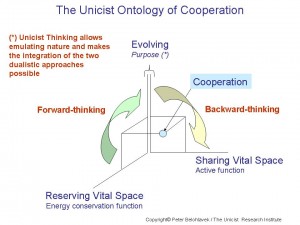 Cooperation implies the capacity of sharing one’s space in order to develop activities. This sharing implies a complementary competition which drives towards evolution.
Cooperation implies the capacity of sharing one’s space in order to develop activities. This sharing implies a complementary competition which drives towards evolution.
Without cooperation the internal competitiveness in institutions produces paradoxical results.
Cooperation implies sharing one’s vital space while having reserved some place where that is not shared with others.
Cooperation implies the integration of a sharing activity and a place for one’s security.
Without reserving a safe place individuals cannot cooperate and competition is transformed into an utopia.
Cooperation Ethics Code
to develop competitiveness
Building a cooperative environment requires:
– Cooperating with others and sharing with them what they need
– Sharing others’ successes
– Fulfilling and making others fulfil their commitments on time
– Being self-confident
– Being predictable, reliable and secure
– Respecting and demanding respect from others
– Establishing complementarities
– Managing the rules of diplomacy
– Widening the shared vital space
– Establishing strong functional and personal bonds
Cooperation is a catalyst for individual and institutional learning. The lack of cooperation transforms competition into institutional self-destruction.
Peter Belohlavek
